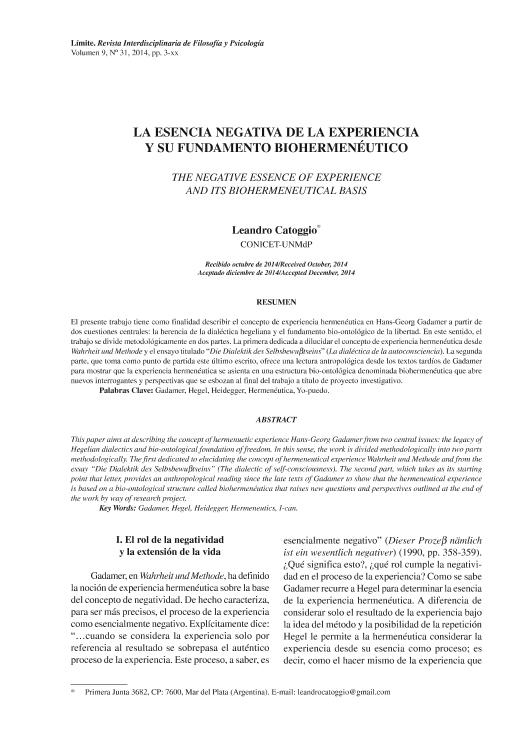Mostrar el registro sencillo del ítem
dc.contributor.author
Catoggio, Leandro Martín

dc.date.available
2020-03-27T19:07:29Z
dc.date.issued
2014-11
dc.identifier.citation
Catoggio, Leandro Martín; La esencia negativa de la experiencia y su fundamento biohermenéutico; Universidad de Tarapacá; Límite; 9; 31; 11-2014; 1-8
dc.identifier.issn
0718-5065
dc.identifier.uri
http://hdl.handle.net/11336/101117
dc.description.abstract
El presente trabajo tiene como finalidad describir el concepto de experiencia hermenéutica en Hans-Georg Gadamer a partir de dos cuestiones centrales: la herencia de la dialéctica hegeliana y el fundamento bio-ontológico de la libertad. En este sentido, el trabajo se divide metodológicamente en dos partes. La primera dedicada a dilucidar el concepto de experiencia hermenéutica desde Wahrheit und Methode y el ensayo titulado “Die Dialektik des Selbsbewuβtseins” (La dialéctica de la autoconsciencia). La segunda parte, que toma como punto de partida este último escrito, ofrece una lectura antropológica desde los textos tardíos de Gadamer para mostrar que la experiencia hermenéutica se asienta en una estructura bio-ontológica denominada biohermenéutica que abre nuevos interrogantes y perspectivas que se esbozan al final del trabajo a título de proyecto investigativo.
dc.description.abstract
This paper aims at describing the concept of hermenuetic experience Hans-Georg Gadamer from two central issues: the legacy of Hegelian dialectics and bio-ontological foundation of freedom. In this sense, the work is divided methodologically into two parts methodologically. The first dedicated to elucidating the concept of hermeneutical experience Wahrheit und Methode and from the essay “Die Dialektik des Selbsbewuβtseins” (The dialectic of self-consciousness). The second part, which takes as its starting point that letter, provides an anthropological reading since the late texts of Gadamer to show that the hermeneutical experience is based on a bio-ontological structure called biohermenéutica that raises new questions and perspectives outlined at the end of the work by way of research project.
dc.format
application/pdf
dc.language.iso
spa
dc.publisher
Universidad de Tarapacá
dc.rights
info:eu-repo/semantics/openAccess
dc.rights.uri
https://creativecommons.org/licenses/by/2.5/ar/
dc.subject
Gadamer
dc.subject
Hegel
dc.subject
Heidegger
dc.subject
Yo-puedo
dc.subject.classification
Otras Filosofía, Étnica y Religión

dc.subject.classification
Filosofía, Ética y Religión

dc.subject.classification
HUMANIDADES

dc.title
La esencia negativa de la experiencia y su fundamento biohermenéutico
dc.title
The negative essence of experience and its biohermeneutical basis
dc.type
info:eu-repo/semantics/article
dc.type
info:ar-repo/semantics/artículo
dc.type
info:eu-repo/semantics/publishedVersion
dc.date.updated
2020-03-12T15:15:24Z
dc.journal.volume
9
dc.journal.number
31
dc.journal.pagination
1-8
dc.journal.pais
Chile

dc.journal.ciudad
Tarapacá
dc.description.fil
Fil: Catoggio, Leandro Martín. Consejo Nacional de Investigaciones Científicas y Técnicas. Centro Científico Tecnológico Conicet - Mar del Plata; Argentina. Universidad Nacional de Mar del Plata; Argentina
dc.journal.title
Límite
dc.relation.alternativeid
info:eu-repo/semantics/altIdentifier/url/https://www.revistalimite.cl/index.php/limite/article/view/31
Archivos asociados
